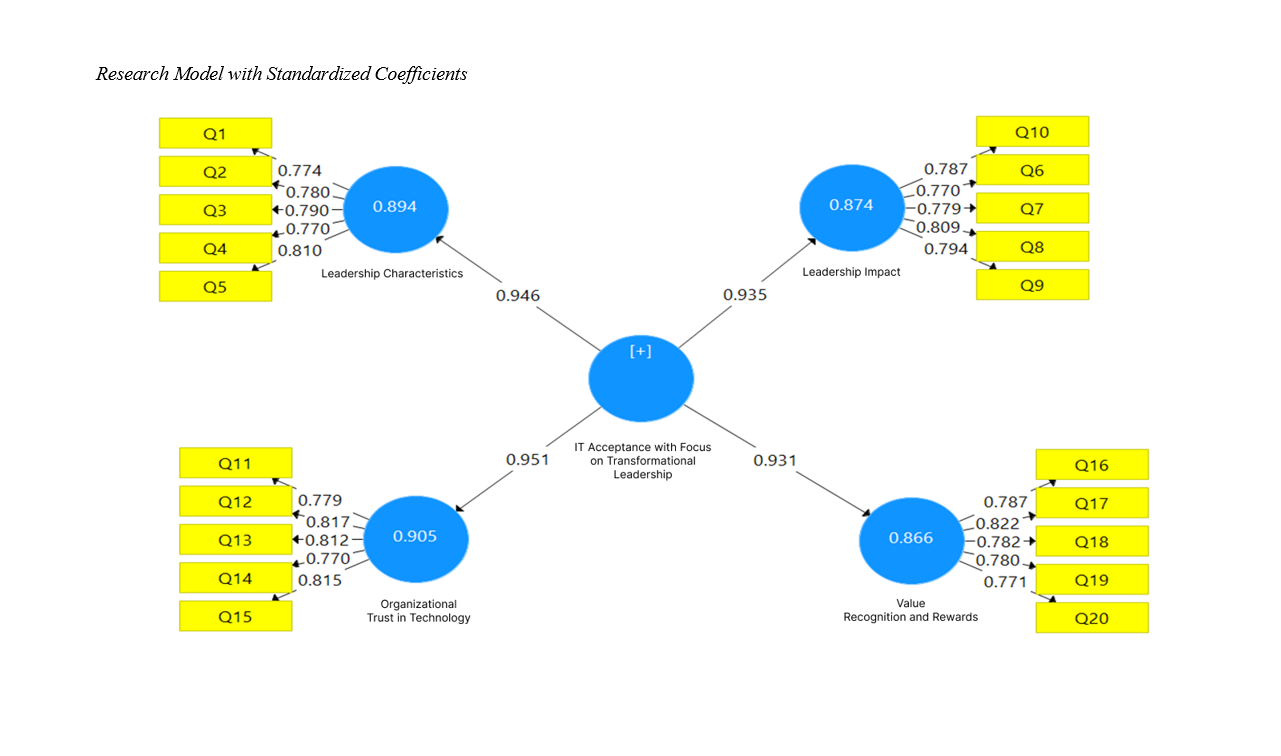Design and Evaluation of an IT Acceptance Model for Employees with Emphasis on the Role of Transformational Leadership
Keywords:
Transformational leadership, IT acceptance, public organizations, employee motivation, digital transformation, leadership competenciesAbstract
This study aimed to design and evaluate a model for employee acceptance of information technology (IT) with a specific focus on the role of transformational leadership within public sector organizations. The research employed a mixed-method design combining qualitative and quantitative approaches. In the qualitative phase, thematic analysis was conducted based on semi-structured interviews with 10 experts and managers from public organizations in Karbala, selected through purposive and snowball sampling. In the quantitative phase, a survey was administered to 384 randomly selected employees from the same organizational setting using a researcher-developed questionnaire. Data were analyzed using SPSS for descriptive statistics and SmartPLS for structural equation modeling to test the model’s dimensions and paths. The model's goodness-of-fit was evaluated using the GOF index, confirming a strong overall fit (GOF = 0.67). The results revealed four main components in the IT acceptance model: leadership characteristics (e.g., motivating employees, fostering innovation), leadership impact (e.g., promoting knowledge sharing, enhancing security), organizational trust in technology (e.g., managing change, encouraging creativity), and value recognition and rewards (e.g., professional growth, acknowledgment of achievements). All hypothesized relationships were statistically significant with high t-values (e.g., t = 222.35 for the relationship between transformational leadership and trust in technology) and strong second-order factor loadings (ranging from 0.93 to 0.95), confirming the model’s validity. Transformational leadership significantly influences the acceptance of IT among employees by fostering motivation, building trust in technology, encouraging innovation, and recognizing contributions. These leadership behaviors not only reduce resistance to change but also facilitate effective implementation of digital tools. The study recommends that public organizations invest in transformational leadership development to enhance IT-driven performance and innovation outcomes.
References
Afiani, R., Surachim, A., & Masharyono, M. (2019). Peran kepemimpinan transformasional dalam meningkatkan employee engagement dan dampaknya pada kinerja pegawai. Journal of Business Management Education, 4(1), 1-6. https://doi.org/10.17509/jbme.v4i1.15880
Asbari, M., Novitasari, D., Purwanto, A., Fahmi, K., & Setiawan, T. (2021). Self-leadership to Innovation: The Role of Knowledge Sharing. International Journal of Social and Management Studies (IJOSMAS), 02(05), 21-36. https://www.researchgate.net/publication/355789438_Self-leadership_to_Innovation_The_Role_of_Knowledge_Sharing
Gadzali, S. S., Gazalin, J., Sutrisno, S., Prasetya, Y. B., & Ausat, A. M. A. (2023). Human Resource Management Strategy in Organisational Digital Transformation. Jurnal Minfo Polgan, 12(2), 760-770. https://doi.org/10.33395/jmp.v12i1.12508
Harahap, M. A. K., Kraugusteeliana, K., Pramono, S. A., Jian, O. Z., & Ausat, A. M. A. (2023). The Role of Information Technology in Improving Urban Governance. Jurnal Minfo Polgan, 12(2), 371-379. https://doi.org/10.33395/jmp.v12i1.12405
Muzakki, M. H., Susilo, H., & Yuniarto, S. R. (2016). Pengaruh penggunaan teknologi informasi terhada kinerja karyawan (studi pada karyawan PT. Telkom pusat divisi regional V Surabaya). Jurnal Administrasi Bisnis, 39(2), 169-175. http://download.garuda.kemdikbud.go.id/article.php?article=635909&val=6468&title=PENGARUH%20PENGGUNAAN%20TEKNOLOGI%20INFORMASI%20TERHADAP%20KINERJA%20KARYAWAN%20Studi%20Pada%20Karyawan%20PT%20TELKOM%20Pusat%20Divisi%20Regional%20V%20Surabaya
Nguyen, M. (2023). I see myself in my leader: transformational leadership and its impact on employees' technology-mediated knowledge sharing in professional service firms. Journal of Service Theory and Practice, 33(2), 257-279. https://doi.org/10.1108/JSTP-04-2022-0093
Pakpahan, D. H., & Sambung, R. (2022). The impact of knowledge sharing on employee performance at Palangka Raya's health college. International Journal of Research in Business and Social Science, 11(5), 273-281. https://doi.org/10.20525/ijrbs.v11i5.1858
Rukman, W. Y., Urath, S., Harini, H., Ausat, A. M. A., & Suherlan, S. (2023). Philosophy Education as a Means of Developing Student Soft Skills. Edumaspul: Jurnal Pendidikan, 7(1), 281-286. http://download.garuda.kemdikbud.go.id/article.php?article=3406210&val=13953&title=Philosophy%20Education%20as%20a%20Means%20of%20Developing%20Student%20Soft%20Skills
Schiuma, G., Santarsiero, F., Carlucci, D., & Jarrar, Y. (2024). Transformative leadership competencies for organizational digital transformation. Business Horizons. https://doi.org/10.1016/j.bushor.2024.04.004
Sutrisno, S., Kuraesin, A. D., Siminto, S., Irawansyah, I., & Ausat, A. M. A. (2023). The Role of Information Technology in Driving Innovation and Entrepreneurial Business Growth. Jurnal Minfo Polgan, 12(2), 586-597. https://doi.org/10.33395/jmp.v12i1.12463
Tarigan, M., Harahap, M. A. K., Sari, D. M., Sakinah, R. D., & Ausat, A. M. A. (2023). Understanding Social Media: Benefits of Social Media for Individuals. Jurnal Pendidikan Tambusai, 7(1), 2317-2322. https://jptam.org/index.php/jptam/article/view/5559
Yang, Y., Li, Z., Liang, L., & Zhang, X. (2021). Why and when paradoxical leader behavior impacts employee creativity: Thriving at work and psychological safety. Current Psychology, 40(4), 1911-1922. https://doi.org/10.1007/s12144-018-0095-1

Downloads
Published
Submitted
Revised
Accepted
Issue
Section
License
Copyright (c) 2025 Radhwan Jabbar Joudah Alhameedawi (Author); Sayed Hamidreza Mirtavousi; Tariq Kadhim Shlaka, Saeid Aghasi (Author)

This work is licensed under a Creative Commons Attribution-NonCommercial 4.0 International License.









